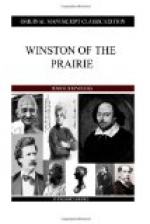“Well,” said Courthorne slowly, “you can consider it a deal.”
CHAPTER XVI
FACING THE FLAME
Courthorne rode away next morning, and some weeks had passed when Maud Barrington came upon Winston sitting beside his mower in a sloo. He did not at first see her, for the rattle of the machines in a neighboring hollow drowned the muffled beat of hoofs, and the girl, reining her horse in, looked down on him. The man was sitting very still, which was unusual for him, hammer in his hand, gazing straight before him, as though he could see something beyond the shimmering heat that danced along the rim of the prairie.
Summer had come, and the grass, which grew scarcely ankle-deep on the great levels, was once more white and dry, but in the hollows that had held the melting snow it stood waist-high, scented with peppermint, harsh and wiry, and Winston had set out with every man he had to harvest it. Already a line of loaded wagons crawled slowly across the prairie, and men and horses moved half-seen amid the dust that whirled about another sloo. Out of it came the trampling of hoofs and the musical tinkle of steel.
Suddenly Winston looked up, and the care which was stamped upon it fled from his face when he saw the girl. The dust that lay thick upon his garments had spared her, and as she sat, patting the restless horse, with a little smile on her face which showed beneath the big white hat, something in her dainty freshness reacted upon the tired man’s fancy. He had long borne the stress and the burden, and as he watched her a longing came upon him, as it had too often for his tranquillity since he had been at Silverdale, to taste, for a short space of time at least, a life of leisure and refinement. This woman who had been born to it could, it seemed to him, lift the man she trusted beyond the sordid cares of the turmoil to her own high level, and as he waited for her to speak, a fit of passion shook him. It betrayed itself only by the sudden hardening of his face.
“It is the first time I have surprised you idle. You were dreaming,” she said.
Winston smiled a trifle mirthlessly. “I was, but I am afraid the fulfillment of the dreams is not for me. One is apt to be pulled up suddenly when he ventures overfar.”
“We are inquisitive, you know,” said Maud Barrington; “can’t you tell me what they were?”
Winston did not know what impulse swayed him, and afterwards blamed himself for complying, but the girl’s interest compelled him, and he showed her a little of what was in his heart.
“I fancied I saw Silverdale gorging the elevators with the choicest wheat,” he said. “A new bridge flung level across the ravine where the wagons go down half-loaded to the creek; a dam turning the hollow into a lake, and big turbines driving our own flouring mill. Then there were herds of cattle fattening on the strippings of the grain that wasteful people burn, our products clamored for, east in the old country and west in British Columbia—and for a back-ground, prosperity and power, even if it was paid for with half the traditions of Silverdale. Still, you see it may all be due to the effect of the fierce sunshine on an idle man’s fancy.”




